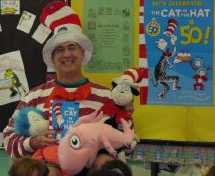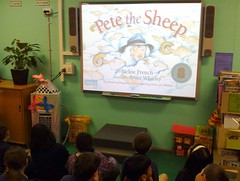
I have organised a wiki activity page based on the picture book, Arthur by Amanda Graham and Donna Gynell, which is the book being used for the upcoming ALIA National Simultaneous Storytime on Wednesday 21st May at 11.00 am (Term Two, Week 5). A group of nearby Priority Schools Programs (PSP) schools have recently formed a professional network, to prepare for our forthcoming interactive whiteboards. The Penrith Reading Project: Books from Birth (another local PSP initiative, containing different local schools), has also been invited to join us for the reading.
My colleague, Kerrie Mead, and I have been brainstorming possible activities to support Simultaneous Reading Day. Here’s what a draft of what we plan to present to the staff of our own school on Monday, and we’ll be making the material available online – as a blog and wiki – for the other schools. (An email today tells me that the ALIA site offers even more activities, many downloadable.)
On Wednesday 21st May 2008, at 11.00 am, children all over Australia will be reading, listening to and commenting on the same story at the same time. The featured book is Arthur by Amanda Graham and Donna Gynell.
At 11:00 am we could:
* Gather in the hall and listen to the story en masse: one reader, readers from a single group (class, Student Representative Council members, captains and prefects, teachers, parents or __________________ ).
* Gather in three groups (Early Stage 1 and Stage 1; Stage 2; Stage 3) in the hall, upstairs area and library and read the story as above.
Before the day: (in class, at Stage meeting, at assemblies)
* Let the students know about it – the purpose of the exercise, the significance of this kind of literary activity, how it might be the same/different in each school. (Great Circle Time material!)
* Familiarise your students with the text. (See ideas below.)
* Outline how the event will be held – ask for ideas which the students think might improve the plan and let us know before the day!
* Promote the event in the school newsletter.
* Signage around the school for parents and students.
* Check out the official ALIA page, and links to free blackline activity sheets.
* Supplement our resources with official posters and the link to Era Publications.
After the event:
* Ask your students for feedback – eg. The best thing was… ; I didn’t expect that to happen; next time… , etc.
* Tell the PSP committee what you really think.
Some ideas to familarise your students in all the wonderful ways you know how to capture their imagination! (Our school has rounded up several copies of the Arthur picture book, a big book version, two sequels and an Arthur hand puppet.)
Early Stage 1/Stage 1:
Who is in the story? Where does it take place? (eg. Paint Arthur or your pet, write a list, make a shop diagram, role play, add a pet image to the wiki.)
What is Arthur’s problem? How does he try to solve it? (eg. Feelings barometer, descriptive writing, pet ownership graph, alliterative pet adjectives for the wiki – perfect pup, quaint quarrion, timid tabby.)
Pets need… – but what might pets want?
If I was a pet I’d like to be a ………………………. because …………………………
Interactive learning objects from TaLe (click on Primary and use search engine).
Stage 2:
Any or all of the above, plus
Descriptor matrix (eg. “Purple, spotty, three-headed wombat”) – and then create it.
Research – eg. Which animals are the most difficult to keep as pets and why? What is the best dog breed for (type of person/situation)? Who is the most famous pet and why?
Extend-a-story – eg. What other pets could Arthur have imitated and what would he have done? Write a new version of the story. Compare this book with the similarly-themed Edward the emu by Sheena Knowles and Rod Clement.
The perfect pet for ………………….. would be a …………………… because.
Stage 3:
As above, plus
“Unpack” the form of the story (repetition, chorusing, types of words used).
What are the conventions of picture books? Examine favourites from home and the school library to discover similarities/differences. Write and illustrate your own picture book.
Read the story with your buddy (Buddy Classes – pairs of students from different stages) and ask them some prepared questions about it.
What is the moral of the story? What is a moral? what is the point of stories with morals? What other moral stories (and traditional fables) do you know? Which ones make good sense… or not?
Check out the interactive Stage 3 learning objects from TaLe (click on Primary and use search engine).



